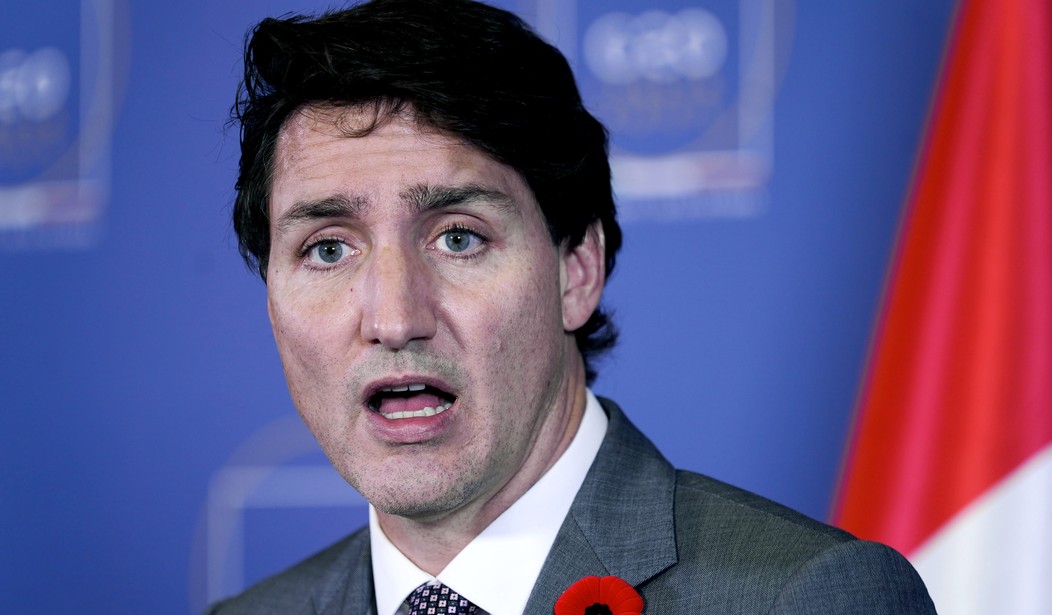Last week, I wondered whether Canada’s parliamentarians would go on the record in backing Justin Trudeau’s unprecedented use of the Emergencies Act to deal with a non-violent political protest. The act requires parliamentary approval within seven days, and in a party-line vote, the legislature upheld Trudeau’s decision.
Shameful, but thus far legal and largely predictable:
Canada’s Parliament has backed the government’s decision to impose emergency powers to deal with weeks-long protest blockades against Covid restrictions.
The motion passed with 185 votes to 151 on Monday, with the support of the Liberals and the left-leaning NDP.
But didn’t Ottawa police finally clear the trucks out of the way? Trudeau claims he won’t keep his emergency powers for long, but that the danger of more non-violent protests still remains:
Earlier on Monday, the Liberal prime minister defended the continued use of the temporary emergency measures, saying that the situation across the country “is still fragile” and they are needed to prevent new blockades.
He said the powers would not be kept in place for “a single day longer than necessary”.
So what’s “necessary”? Expect that definition to be as elastic as Trudeau’s moral consistency on non-violent protests:
Asked whether the wide-spanning national emergency powers are still required, given that blockades at border crossings have been alleviated and downtown Ottawa is quiet and largely free from trucks or convoy protesters after a weekend of massive police operations, Trudeau said that the situation prompting the use of the Act has not entirely been resolved.
There are still people and trucks who are affiliated with anti-COVID-19 mandates and anti-government protests gathered in Arnprior and Embrun, two towns on either side of Ottawa, that have indicated an interest in resuming blockades, Trudeau said.
“We will re-evaluate every single day, but right now, when the situation is still of people prepositioning, people being out there indicating that they are ready to blockade, to continue their illegal occupations, to disrupt Canadians’ lives, we feel that this measure needs to remain in place,” he said. “We hope to only keep it in place for a number more days.”
As of Monday morning, there have been 196 arrests of “Freedom Convoy” participants in Ottawa, and 115 vehicles have been towed. Nearly 400 charges have been laid so far, ranging from mischief and obstruction, to assaulting a police officer. Checkpoints remain active around the downtown core, with only those who work, live or have a lawful reason to be in the area allowed to enter, as and crews continue to collect garbage and debris left in the streets.
How free people in Ottawa must feel today!
As expected, Trudeau’s Liberal party linked arms with the New Democrats on this vote. The Conservatives and Bloc Quebeçois opposed it. The unanimity on this point, especially considering the extreme nature of Trudeau’s move — and its utter hypocrisy, let’s not forget — reveals something about the dynamic in Ottawa at the moment. Trudeau’s speech on the matter made it a de facto confidence vote, and it seems that Liberals and New Democrats don’t want an election:
Leading up to the vote, there were signs the government had decided to make it a confidence vote, meaning that if it failed, the minority Liberal government could have fallen, which would have triggered an election.
Trudeau had not officially designated the vote as such, but he opened the door to that interpretation by likening the decision to a vote on a throne speech, which lays out the government’s agenda.
“I can’t imagine that anyone who votes ‘no’ tonight is doing anything other than indicating that they don’t trust the government to make incredibly momentous and important decisions at a very difficult time,” he said at a news conference earlier in the day. …
Toronto Liberal MP Nathaniel Erskine-Smith, who voted in favour, said in the debate he might have voted against continuing to use the act now that the blockades had ended. He said he would vote yes because he had no interest in helping trigger an election.
Joël Lightbound, a Liberal MP who has criticized the government over its handling of the crisis, said invoking the act was “a slippery slope.” He said he would be inclined to vote against the measures if it were not a vote of confidence, and asked for clarification from ministers. He also voted in favour of the motion Monday night.
Go figure that Trudeau’s party doesn’t want to face voters in the next few weeks. I wonder why. They’re probably betting that the pandemic’s evolution into an endemic issue will allow the government to curtail the mandates and dial down the political tension by the time the Emergencies Act powers expire in mid-March. At that point, the Liberals and NDP must hope, the controversial nature of Trudeau’s assumption of wartime powers to deal with political dissent will fade from memory, or at least from the top of the priority list for Canadian voters.
Perhaps they’re right, but I’d be skeptical about that. Canadians have lived with Trudeau’s hypocrisies and high-handed tactics for years even before last week’s assumption of war powers. Parliament’s acquiescence may well make a lasting and populist mark on Canada’s electorate. As they proved in Adscam, Canadians are pleasant but they’re not happy to be played for suckers.
Update: My Twitter pal Aaron Walker points out that the Canadian senate has to also ratify Trudeau’s actions. That’s expected to happen shortly, but we’ll update if anything changes. A rejection by the senate wouldn’t trigger an election, I believe.








Join the conversation as a VIP Member